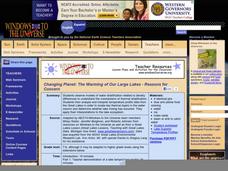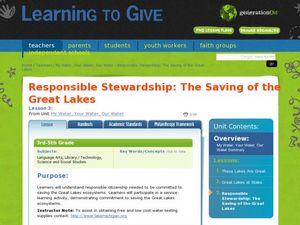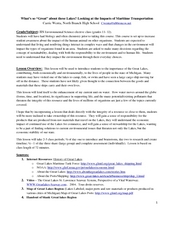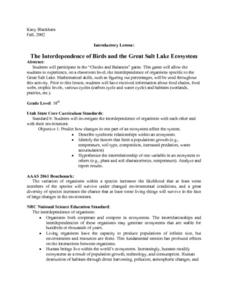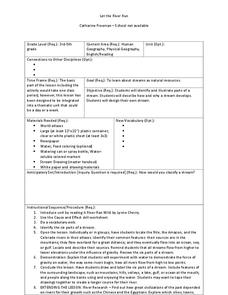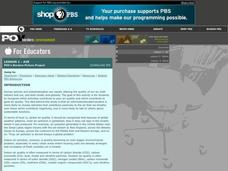Curated OER
Changing Planet: The Warming of Our Large Lakes - Reasons for Concern
Another A+ instructional activity on the impact of climate change comes to you from the National Earth Science Teachers Association. In this installment, learners model the stratification of water in lakes due to temperature differences....
Curated OER
Responsible Stewardship: The Saving of the Great Lakes
Students devise a plan to protect the Great Lakes. In this environmental lesson, students conduct research to identify nonprofit groups that help protect the waterways. Students write letters to the Congressman or a nonprofit...
Curated OER
These Lakes are Great
Young scholars examine the Great Lakes Basin and water conservation. In this Great Lakes and water activity, students study the location of the lakes before reading the book, The River Ran Wild. They discuss the associated vocabulary and...
Michigan Sea Grant
Environmental Decision Making
Pupils participate in a board game activity in which landing on a space called "Decision Card" presents them with a land-use situation to consider and decide how to act. In order to advance in Hydropoly, players must think critically and...
Curated OER
Pollution Assessment: Is Wood Lake a Good Lake?
Young scholars become aware of pollution in Richfield Minnesota's Wood Lake, identify sources of pollution in Wood Lake, learn to use variables, equations, spreadsheets and modeling software, and generate solutions for the problem.
Curated OER
the New Explorers:Into the Depths
Students explore the self preservation mechanism that is inherent in the Great Lakes. They examine how scientists are studying Great Lakes, and what their predictions are for these national treasures.
Curated OER
What’s so “Great” about these Lakes?
Students label the regions and major ports of the Great Lakes region. In this environmental science lesson, students create a timeline about the history and development of the Great Lakes. They discuss the problems its facing today.
Curated OER
Exploring Great Salt Lake Ecosystem
Fourth graders determine the Great Salt Lake is a unique, thriving, and diverse ecosystem. They engage in an actual or a virtual field trip. They record field trip, whether actual or virtual, in science lab book or journal and...
Curated OER
Exploring the Great Salt Lake
Third graders participate in a scavenger hunt, looking for things that are unique about the ecosystem in and around the lake. They observe and describe a variety of habitats and distinguish living and nonliving elements of...
Curated OER
Lake Effect
Fourth graders explore some of the effects Great Salt Lake has on Utah's local weather/temperature moderation, lake effect storms, and temperature inversions. They observe the differences of specific heat between soil and water and...
Curated OER
The Interdependence of Birds and the Great Salt Lake Ecosystem
Tenth graders participate in the "Checks and Balances" game. This game lets them experience the interdependence of oragnisms specific to the Great Salt Lake. They recieved informaton about food chains, food webs, trophic levels various...
Curated OER
Problem Based Learning Scenario
Learners research about the function of MPA's. In this marine science lesson plan, students explore how humans influence changes near these areas. They explore different MPA's in the Great Lakes region.
National Energy Education Development Project
Great Energy Debate
If someone yelled for eight years and eight months, they could produce enough energy to heat one cup of coffee. A lesson on energy encourages scholars to research 10 different energy sources in groups before playing a game. Twenty...
US Environmental Protection Agency
Non-Point Source Pollution
Investigate the different types of pollution that storm drain runoff carries into oceans, lakes, rivers, and streams with this class demonstration. Using an aquarium and an assortment of everyday items that contaminants like motor oil,...
Curated OER
Water Properties of the Great Salt Lake
Fourth graders examine the ecosystem of the Great Salt Lake in this two-part instructional activity, completing a KWL chart before and after the field trip to the site. While there, they draw and write about their observations. To test...
Curated OER
Invasive Species
Eighth graders explain the impact of exotic species to an ecosystem. In this environmental science lesson, 8th graders brainstorm ways to eliminate invasive species. They share their ideas in class.
Curated OER
Zebra Mussels
In this zebra mussels worksheet, 7th graders read an article about zebra mussel populations in United States' lakes and rivers. Students read about the negative effects and some positive results and then answer several questions about...
Curated OER
The Human Impact on the Environment
Despite the typos and formatting issues, the Word document found here has some great potential. There are two questions that ask learners to put several events in a logical order; these could easily be made into a card sort activity....
Curated OER
Let the River Run
Learners explore the environment by reading a story in class. In this water formation lesson, students define environmental terms such as rivers, streams, gulf, oceans and lakes. Learners read the story A River Ran Wild and discuss the...
Curated OER
"Eggs-perimenting" Fun
Students dissolve salt into water, place an egg into a glass of salt water, observe and record observations, make a scientific hypothesis, summarize what they studied from this hands-on experiment. They share their ideas and findings...
Chicago Botanic Garden
Review and Assessment: Causes and Effects of Climate Changes
The last activity in the series of five is a short one where individuals show what they've learned about the causes and effects of climate change. Working independently, they fill in a graphic organizer, then compare their notes with a...
Howard Hughes Medical Institute
What van Leeuwenhoek Saw
When van Leeuwenhoek saw cells and single-celled organisms for the first time, he knew these small things were a big deal! Share his discoveries with young learners through a narrated video, model-building activity, and scale study....
San Francisco Public Utilities Commission
Hetch Hetchy: The Story of San Francisco's Water
How did San Francisco supply enough water for its residents over the last two centuries? Learn about droughts and water conservation in California, as well as specific historical events that led to the water system today. Kids read two...
Curated OER
P.O.V.'s Borders Picture Project: Lesson 1 - Air
Take photos of human activities that impact air quality. Collaborative groups present one of the photographs, identifying how the activity contributes to air quality and what can be done to minimize the impact. As one in a series of...
Other popular searches
- Great Lakes Worksheet
- Great Lakes Biodiversity
- Great Lakes Map
- Label the Great Lakes
- Maps of Great Lakes
- The Great Lakes
- Michigan's Great Lakes
- Five Great Lakes
- Great Lakes Region
- Great Lakes Lesson Plans
- Traveling the Great Lakes
- Activities the Great Lakes


